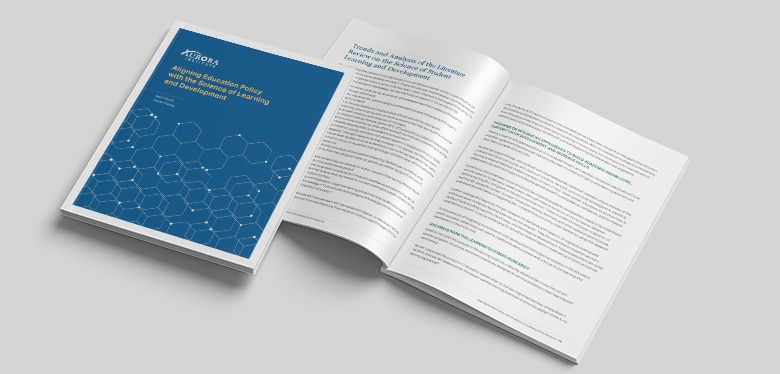Trends and Analysis of Learning Sciences Literature
Education Domain Blog
By synthesizing the research and resources from the literature review in our report, Aligning Education Policy with the Science of Learning and Development, common trends emerge from the findings on how humans develop and learn. These include how children develop into whole individuals and learners and the optimal ways in which children learn, retain information, and progress in their learning.
The following is a list of the most powerful takeaways from learning sciences research that can inform education policy:
Development & Learning
- Brain science shows that social, emotional, and academic learning is malleable and extends from childhood through adulthood.
- Behavior, skills, dispositions, and mindsets are learned concepts and can be explicitly taught (for example, growth mindset).
- Context, such as environments and relationships, affect and inform development.
Trauma
- Students experiencing recurring trauma can have symptoms that deter learning. Trauma affects memory and retention of concepts.
- Providing students with safe, supportive environments can help offset some of the stress associated with trauma and help students toward healthy development.
Learning Is Not Linear
- Student learning is diverse, varied, and does not always happen in a straight and narrow line; instead, students learn “jaggedly” through interconnecting concepts. For example, the traditional model of K-12 education moves each student from one standard or unit to the next, regardless of their mastery. However, it is important to focus on students moving through competencies on demonstrated mastery and personalized learning progressions.
- We also see individuality as a facet of the science of learning. Students learn and develop along pathways as unique as their neurological make-up, genetic expression, background, and personal experiences.
Motivation & Cognition
- Students are motivated when they are involved in and co-owners of their learning, and when they are learning in their zone of proximal development.
- Students’ sophisticated cognitive functions and funds of knowledge are activated when they feel like they belong, are supported to succeed, are helped to connect meaningfully to peers and adults, and are exploring topics that matter to them.
- Cognitive learning is connected to memory and motivation, and it is maximized when students are accessing and building on prior knowledge. This includes both background knowledge and culture, as well as previously learned and applied concepts.
All facets of how humans develop and learn are interrelated, and they influence our experiences. The literature makes clear that, for too long, the domains of cognitive science and child development have been siloed from policy and practice and have been confined to research and academia. With increasing evidence and consensus from the science of learning and development surfacing in recent years, the implications for how education systems teach and prepare every student are numerous.
There is a need for a broader perspective on how students learn and develop into whole individuals and how education systems and educators can best provide a well-rounded and high-quality learning environment that meets the needs of every child.
Student learning is nonlinear, individualized, and influenced by the interaction between unique aspects of the child and their family, community, and classroom contexts. Schools can be designed more powerfully to attend to the unique needs of individual children and support them in their development. Educators must know how to differentiate instruction and supports to enable optimal growth in competence, confidence, and motivation.
Furthermore, the link between social-emotional learning (SEL) and academic development needs to be understood and advocated for by education stakeholders. Although there is evidence of the correlation between explicitly teaching SEL and growth in academic achievement, there is a lack of intentional integration of teaching SEL alongside content.
Another challenge and reason for the gap between the demands and research of cognitive science and child development is that the learning sciences are not singular. They comprise research across a variety of fields, including cognition, psychology, neurological development, among others. These subdomains are rarely integrated, and as such, it can be challenging for education stakeholders to make sense of them as a whole.
To do a better job of integrating the science of child development and cognitive research in the education system, education stakeholders will need to redefine student success with a focus on the learning and development of the whole child.
Learn more:
- Issue Brief – Future Focused State Policy Actions to Transform K-12 Education
- Report – Current to Future State: Issues and Action Steps for State Policy to Support Personalized, Competency-Based Learning
- Report – Fit for Purpose: Taking the Long View on Systems Change and Policy to Support Competency Education
- Turnaround for Children Report – Building Blocks for Learning: A Framework for Comprehensive Student Development
- Aspen Institute Report – From a Nation at Risk to a Nation at Hope: Recommendations from the National Commission on Social Emotional Learning and Academic Development
- Deans for Impact Report – The Science of Learning
Previous posts in this series:
